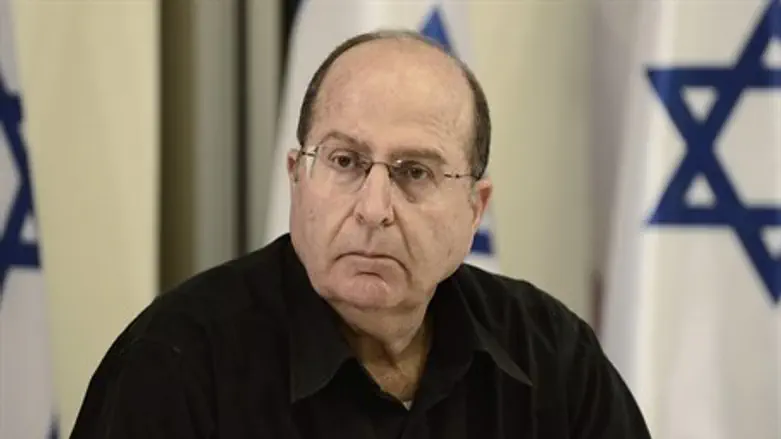
The Palestinian Arabs will not have a “state” but rather an “autonomy”, Defense Minister Moshe Ya’alon told the Israel Hayom daily newspaper in an interview published Wednesday.
“Our efforts to create shortcuts over the last two decades -- from Oslo until present day -- have all failed,” he said. “We know how to live with it. It is certainly not necessary to control them. We can give them political autonomy like they have now,” said Ya’alon.
"We withdrew from Gaza. The Gazans chose Hamas, which in turn chose to manufacture rockets instead of exporting strawberries, and for that they are paying a price,” he told the newspaper. “It is probably not a permanent and stable solution, but it is important to talk about 'crisis management' in regard to Gaza as well as Judea and Samaria in such a way that will serve our interests.”
Asked whether Palestinian Authority (PA) Chairman Mahmoud Abbas is still a partner for peace, Ya’alon replied, "Abbas has never said that he recognizes us as the nation state of the Jewish people. He also never said that if a compromise is reached, even one that adheres to his vision of [pre-]1967 borders, it would end the conflict and the [Palestinian] demands. He never said that he has given up on demanding refugee rights. So where can we go with him? He is a partner for discussion; a partner for managing the conflict.”
“I am not looking for a solution, I am looking for a way to manage the conflict and maintain relations in a way that works for our interests. We need to free ourselves of the notion that everything boils down to only one option called a [Palestinian] state,” said the Defense Minister. “As far as I am concerned let them call it the Palestinian Empire. I don't care. It is an autonomy if it is ultimately a demilitarized territory. That is not a status quo, it is the establishment of a modus vivendi that is tolerable and serves our interests."
Ya’alon was asked whether he rejects the so-called “two-state solution”, to which he replied, "Call it whatever you want. The political separation has already happened, and it is a good thing that it has. We are not controlling the lives of the residents of Gaza or Judea and Samaria. This separation is important.”
He continued, “I would encourage and reinforce governability, the economy and the residents' ability to live in dignity and economic comfort. But to derive something so black and white from that? State or no state? Let's put the terminology aside."
“The other side doesn't think that 1967 borders will be the end of the story, and they never said that it would be the end of the story,” stressed Ya’alon. “To them it is merely a stage; it is not about establishing a state, but rather destroying the Jewish state and negating its existence. There is a lack of symmetry here that is not in our favor, so we need to learn how to manage this conflict without delusions."
In the interview, Ya’alon also referred to the media storm that was sparked several months ago when he was quoted as describing U.S. Secretary of State John Kerry as "obsessive and messianic."
The U.S. responded with shock , calling the remarks "offensive" and "inappropriate." Ya'alon later apologized for the remarks, stating that he had no intention of "offending" Kerry.
In the interview with Israel Hayom, Ya’alon stressed that he rejects the allegations that he disrespects Israel's closest ally.
"Did you hear me say it? Someone said that I said it," he said. "Our relationship with the U.S. is very important. First and foremost it is important to us, and I hope it is important to the U.S. too. The defense relationship between us is excellent. My personal relationship with Defense Secretary Chuck Hagel is also excellent, as is the relationship between the Defense Ministry and the Pentagon and between the IDF and the U.S. military. That doesn't mean that there are no disputes, even between friends. But the disputes don't have to manifest themselves in this or that manner.”
Ya’alon continued, "Yes, we disagree sometimes. We disagree on how to handle the Iranian nuclear program; on what to discuss with the Iranians: only terrorism and missiles or centrifuges too? There have been debates on how to confront Egypt with [former President Hosni] Mubarak and with the Muslim Brotherhood and the Americans' relations with [current Egyptian President] Abdel-Fattah Al-Sisi. There were disagreements and we saw things in this way or in a different way. Legitimate arguments behind closed doors.”
"We have a lot of shared interests with the U.S. and that outweighs the disputes,” he added. “Certainly there are shared values on which the two countries are founded. The disputes stem from differences in attitudes and worldviews. Their perspective from there is different than our perspective from here. Disputes are allowed. We have disputes amongst ourselves too -- in the analysis of the situation, in the diagnosis and the prognosis.”
Ya’alon also related in the interview to the "covert" building freeze in Jerusalem, Judea and Samaria, denying there was such a freeze in place.
"There is no construction freeze. Announcements of planning processes have been delayed due to sensitivity concerns,” he stressed, adding, “In that regard, it is important to act wisely and not to bring upon ourselves tough international decisions that we may later regret. We don't want to put ourselves in these corners."
(Arutz Sheva’s North American Desk is keeping you updated until the start of Shmini Atzeret and Simchat Torah in New York. The time posted automatically on all Arutz Sheva articles, however, is Israeli time.)